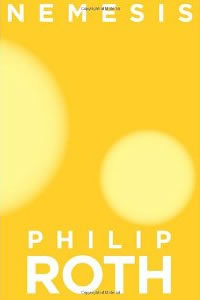Book Notes
 Philip Roth, Nemesis (New York: Houghton Mifflin Harcourt, 2010), 280pp.
Philip Roth, Nemesis (New York: Houghton Mifflin Harcourt, 2010), 280pp.
Nemesis was the Greek goddess of divine vengeance for human pride, which at least makes some sense in the moral calculus of the world. The protagonist of this novel struggles with a worse fate — making sense of undeserved evil. Bucky Cantor, age twenty-three, is the playground director when a polio epidemic ravages inner city Newark in the sweltering summer of 1944. His greatest regret is that poor vision prevented him from joining his buddies Dave and Jake in the war effort overseas. He's left behind to fight a different kind of war, both medical and moral, for at the time polio had no known cure or prevention.
Bucky did not enjoy an idyllic childhood; his mother died in child birth and his father was a thief and a gambler, but under the care of his grandparents he developed into a responsible young man who was a hero to his playground youngsters. When polio took Alan Michael, age twelve, Bucky questioned the scales of divine justice and the role of human agency. Could he have protected his kids by closing the playground? Scapegoating, hysteria and anger divided the neighborhood. Didn't the "Italian wop bastards" bring the virus to their neighborhood? Or maybe it was Syd's filthy hot dog stand? Where was the Health Department? Perhaps the disease spread from handling mail or money? The flies, mosquitoes, and even the disabled Horace with his dirty hygiene incurred blame. It all made Bucky start "hating God, which was confusing his emotions and making him feel very strange."
Fleeing Newark for the clean-n-cool air of the Pocono Mountains seventy miles away at Indian Hill summer camp aggravated his moral quandary. He joined the camp staff with his girl friend Marcia, but quitting Newark felt like an "inexcusable act" of cowardice. Getting engaged to Marcia almost made him forget about God and polio, but was forgetting any way to live? Indian Hill was idyllic, which was precisely the problem; it left him feeling like "he no longer had a conscience he could live with." That conscience, though, remained very much alive when polio came to Indian Hill, and Bucky learned that he himself had carried the virus there.
In the last few pages Roth fast forwards to 1971 and introduces us to the narrator, Arnold Mesnikoff, who was a youngster under Bucky's playground care. They both have polio as adults, but they've parsed their fate in very different ways. Arnold is an atheist for whom fate and human choice are mere mysteries. Bucky has succumbed to guilt and bitterness: "he had the aura of ineradicable failure about him," none of which was deserved for hubris, except , perhaps, for his exaggerated sense of responsibility. All of which makes for an interesting disquisition on the problem of evil.


